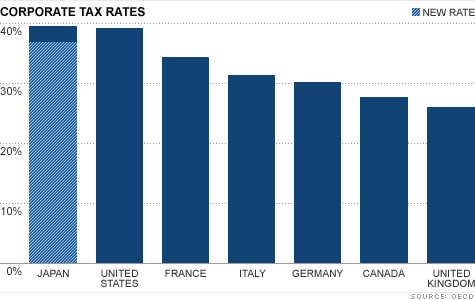Call it yet another unintended consequence of pervasive government intervention.
On one hand, the US has the highest corporate tax rate in the world:

On the other, the US tax code is such that it not only allows but encourages firms, who have sufficient resources, to find global loopholes such as the “Double Irish With A Dutch Sandwich.”

Â
On the third hand, as a result of QE and ZIRP, stock prices have never been higher, which means it has never been a more opportune time for companies to use their record high stock price to acquire targets, which coupled with record cheap debt has led to an M&A bubble unlike any seen previously, with total M&A pace in 2014 set to surpass previous records and with deal consideration paid in stock, at 23%, the highest in, well, ever.

Â
Â

Â
With all these permissive conditions for US corporations to take advantage of the raging M&A bubble, is there any surprise that not a day passes without some US company announcing a “tax-inversion” deal meant to bypass US taxes entirely? Apparently, if you are the government, there is a lot of surprise.
So much so in fact that as WSJ reported last night, the Obama administration itself joined the growing cries over U.S. companies reincorporating overseas for tax purposes, urging lawmakers to pass legislation to limit the moves.
In a letter to leaders of the congressional tax-writing committees, Treasury Secretary Jacob Lew said lawmakers “should enact legislation immediately…to shut down this abuse of our tax system.” The letter was reviewed by The Wall Street Journal on Tuesday night.
Just this week, two U.S.-based drug firms— AbbVie Inc. ABBV +0.11% and Mylan Inc. MYL +1.81% —moved ahead with plans for foreign mergers that would allow them to move overseas and reduce their tax rates. They would join a growing list of about 50 U.S. firms that have reincorporated overseas through inversion in the last 10 years, most of them since 2008.
The trend appears to have accelerated in recent months, as Congress has come up short in an effort to pass a comprehensive tax-code rewrite that would address corporate concerns and make the U.S. system more business-friendly.

